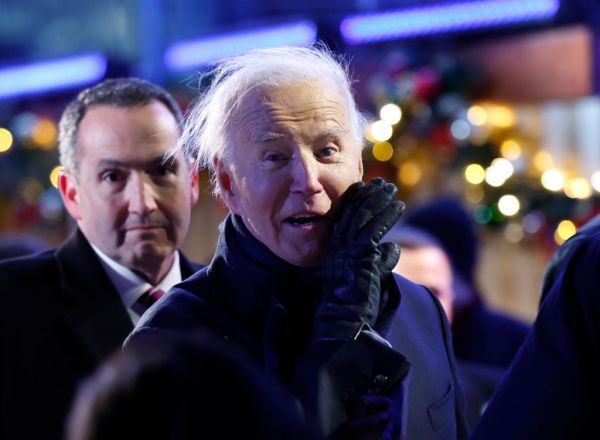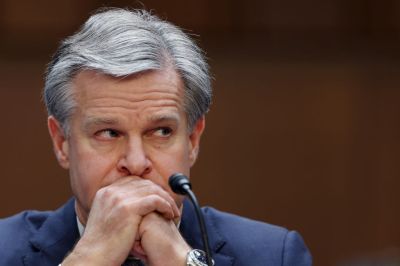First the special counsel, now the director of the FBI: Donald Trump’s “deep state” enemies sure are making things easy for him!
Some of my Never Trump fellow travelers are mad about it. It was bad enough that Jack Smith would quietly resign rather than stay on the job and force Trump to fire him, but for Christopher Wray to follow his lead? Knowing that grifting crank Kash Patel is waiting in the wings to replace him? Unforgivable. Supposedly.
I have no trouble forgiving it, though. What would Wray have accomplished by hanging on until the next administration and daring his new boss to drop the axe, which Trump surely would have done?
Had Wray “fought,” the theory goes, he could at least have made his departure politically painful for the new White House. That’s because, although the FBI director serves at the pleasure of the president, federal law creates a default term in office of 10 years. The point of the statute is to insulate the bureau from partisan politics by establishing a norm in which its leadership ideally overlaps multiple presidential administrations.
Trump wants to shred that norm by dumping Wray and subbing in one of the most servile toadies in American politics. And instead of resisting, Wray chose to roll over and abet his attempt to do so. “This raises the likelihood that the media will treat the replacement of Wray as normal administrative turnover rather than as a scandal,” Jonathan Chait complained.
The media can do whatever it likes (at least until Director Patel is confirmed) but I don’t see why we should assume that Americans might have been scandalized by Wray’s firing, even with reporters egging them on to be outraged. The whole story of this political era and of last month’s election specifically is that the public has a limitless tolerance for Trump’s outrages, vastly greater than the left-leaning media’s.
All the more so in this case, in fact, as Trump has already conditioned Americans to treat firing the FBI director as no big deal. Wray wouldn’t have been the first leader of the bureau that he sent packing, after all.
Ultimately a scandal is a scandal if the public, not the press, says it is. Americans who didn’t care about coup attempts, criminal convictions, and dark pledges to persecute political enemies surely wouldn’t have cared if Trump had violated the esoteric and already crumbling norm against firing FBI chiefs before their 10-year term is up. I find it strange and a bit unsettling that otherwise clear-eyed Trump critics persist in the illusion, post-election, that the people still retain a civic conscience that’s capable of being meaningfully shocked if only the media applies enough voltage.
I think many Americans would have enjoyed watching Trump fire Wray, frankly. And not necessarily because they have anything in particular against him or the FBI.
Resistance is futile.
If you’re mad at Wray for not resisting Patel’s ascension as much as possible, consider the possibility that, by resigning, he did.
Our friend David French pointed out yesterday that federal law limits the president’s authority to fill a vacancy created by a Senate-confirmed official when that official “dies, resigns, or is otherwise unable to perform the functions and duties of the office.” In such cases, the replacement must have been confirmed by the Senate himself or must have served in the agency at a senior level for at least 90 days in the year preceding the vacancy.
If Wray had hung on until January 20 and been fired, Team Trump would have had a legal argument that he hadn’t died, resigned, or been “unable” to perform the duties of the office and therefore Trump’s choice of a replacement shouldn’t be circumscribed by the statute. Because Wray did resign, Trump now potentially has a problem in installing Patel, who hasn’t been confirmed by the Senate to any position and didn’t spend 90 days in a senior role at the FBI over the last 12 months.
I don’t think he has much of a problem, to be clear. Spineless Senate Republicans will probably end up rubber-stamping Patel’s nomination. But he has more of a problem than he would have had if Wray had insisted on being axed.
That’s the optimistic read on why the director chose to stand aside, that by doing so he outmaneuvered Trump and placed a statutory stumbling block in Patel’s path to power. The pessimistic one is that Wray looked at the election results last month and concluded there’s no point in fighting for his job when the people he’s nominally fighting for are on the side of the bad guys.
Trump’s reelection was a jailbreak carried out by his criminal accomplice, the American electorate. Why would a lawman like Wray want to serve that electorate a minute longer than he needs to?
In October I flagged Mark Halperin’s prediction that Trump winning would trigger the biggest mental health crisis in the history of the country. The term “identity crisis” seemed more apt to me, though: It would be less a matter of people sobbing into their pillows than having to reconsider everything they’ve ever believed about American exceptionalism. Reelecting Trump would mean immunizing a convicted felon for well-documented malfeasance in trying to overturn the 2020 election and hoarding sensitive documents from the federal government. “The last best hope of Earth” wouldn’t do such a thing.
We did, though. Knowing that a defeated Trump would be held accountable for serious criminal offenses of which he was almost certainly guilty, America chose to break him out of jail instead. And not just him but numerous co-conspirators in his schemes by extension: Lots of bad guys will go free now that the jail has been breached. Handing presidential pardon powers to Trump is a bit like making John Gotti district attorney.
“The problem that keeps arising is that there is no way to remain in Trump’s favor while following the law,” Chait noted in explaining how Wray, a Trump appointee, became an Enemy of the People. As if to prove the point, Trump celebrated Wray’s resignation in a social media post on Wednesday by reminding fans that “the FBI illegally raided my home, without cause,” which is the opposite of true. The search (not “raid”) of Mar-a-Lago in August 2022 was approved by a judge and happened only after the feds discovered that Trump’s people were lying about having turned over documents in their possession.
The search was legal and justified. And because it was, Trump will never forgive the FBI for it.
“We have one set of laws in this country and they apply to everyone,” Jack Smith said after indicting Trump last June. Wray believes that too, I assume—or did, before the jailbreak on election night. Now that he knows Americans feel differently, he’s not waiting around to give the lying criminal to whom he would otherwise soon report—or his millions of enablers—the satisfaction of taking his badge. I don’t blame him.
The question I posed the day after the election is one to which we’ll return repeatedly over the next four years. If you’re keen to save American norms and institutions from Trump, who are you saving them for? Who, supposedly, is the constituency for your project in a country willing to give a figure as wretched as Trump not just an Electoral College majority but a victory in the popular vote? Christopher Wray may have asked himself that and, failing to find an answer, understandably threw in the towel.
The age of jailbreaks.
I wonder if political jailbreaks will soon become commonplace in America. To the extent they haven’t already, I mean.
Joe Biden’s deplorable pardon of his son is a blatant jailbreak. Unlike Trump, Hunter Biden had actually been convicted of the federal crimes he was charged with. And his father had spoken warmly in the past about the justice system being the “cornerstone of America,” one whose fairness he trusted so completely that he promised not to spare his son from its penalties by granting him clemency.
When he turned around and did it anyway, it felt less like mercy for a deserving convict than busting a prisoner out of his cell just because he could.
The next jailbreak will come next month when Trump pardons some or all of the January 6 insurrectionists. For years right-wing populists have depicted them as political prisoners; you can find fan art on social media that would lead you to think they’ve been treated like Syrian dissidents in one of Bashar al-Assad’s dungeons. Trump himself has described them as “hostages.” No matter how much evidence there is that they weren’t “dupes,” he and his party will connive to treat them like victims to rationalize excusing them for attempting a coup.
At this stage of the right’s moral devolution, it’s frankly hard to imagine a crime so terrible that MAGA true believers wouldn’t support jailbreaking a prominent Trump supporter who committed it as long as he checked the box of formally proclaiming his innocence.
The outburst of (mostly but not entirely) left-wing sympathy for accused murderer Luigi Mangione, already one of the most depraved political spectacles in modern American history, hopefully won’t lead to an actual jailbreak, but there’s good reason to think much of the public would support it if it did. Merchandise celebrating the alleged assassin is being sold; “Wanted” posters of other business executives are appearing around New York City. Trump fanatics at least make a pretense of believing that their man isn’t guilty of the crimes he’s been charged with to justify siding with him against law enforcement. In Mangione’s case, the mask is fully off: It’s because he almost certainly did kill UnitedHealthcare CEO Brian Thompson that he’s regarded as a hero.
We’re in a dark moment when progressive senators can’t resist whatabout-ing a man being shot in the back.
Having the director of the FBI quit in the middle of all this feels like watching a cop get overrun by looters during a riot. Numerous writers have tried to put their fingers on the full-spectrum norms-implosion in the country’s zeitgeist right now—the “great upheaval,” “decivilization”—but whatever you call it, there is a sense that Americans have sized up various Chesterton fences protecting political and cultural institutions and are spoiling to kick those suckers over just to see what happens. Which should make conservatives very nervous.
But maybe it was inevitable. We’re in a post-pandemic era, when Americans have a history of challenging restraints on behavior.
The Roaring Twenties have traditionally been understood as a reaction to the global flu pandemic of 1918 to 1920. Americans dealt with their grief by cutting loose—drinking, jazz, flappers, etc. Survivors of the plague had learned the hard way to appreciate the joy of living and leaned into it. An ethos of carpe diem led to relaxed morals in pursuit of pleasure.
That’s not what the aftermath of COVID has felt like so far, though.
We’re years away from having solid data on big post-pandemic trends but hedonistic pursuits among young Americans were trending downward across the board at last check. The easy explanations for that are the internet, romantic friction between less-educated men and more-educated women, and the modern preoccupation with “wellness.” Young adults aren’t socializing in person as much as they used to and may be more willing to resist common vices (well, some vices) than their grandparents did due to greater conscientiousness about health. The joie de vivre we’d expect after a global health crisis isn’t there the way it was after the Spanish flu.
Americans haven’t become more physically hedonistic after COVID, I don’t think, but they sure do seem to be becoming more politically hedonistic. Hero killers, presidential felons, crony pardons, naked political patronage, a fractured media Tower of Babel, jailbreaks everywhere you turn: Maybe this post-pandemic era is America’s Joker era, where everyone loots what they can and gloms onto some anti-hero to justify it.
That’s why I said earlier that I think many of us would have enjoyed watching Trump fire Christopher Wray irrespective of any grievances they might have against the FBI. In Joker America, the criminal firing the cop is something to savor for its own sake.
Christopher Wray is done with all of it. Good for him.







Please note that we at The Dispatch hold ourselves, our work, and our commenters to a higher standard than other places on the internet. We welcome comments that foster genuine debate or discussion—including comments critical of us or our work—but responses that include ad hominem attacks on fellow Dispatch members or are intended to stoke fear and anger may be moderated.
With your membership, you only have the ability to comment on The Morning Dispatch articles. Consider upgrading to join the conversation everywhere.